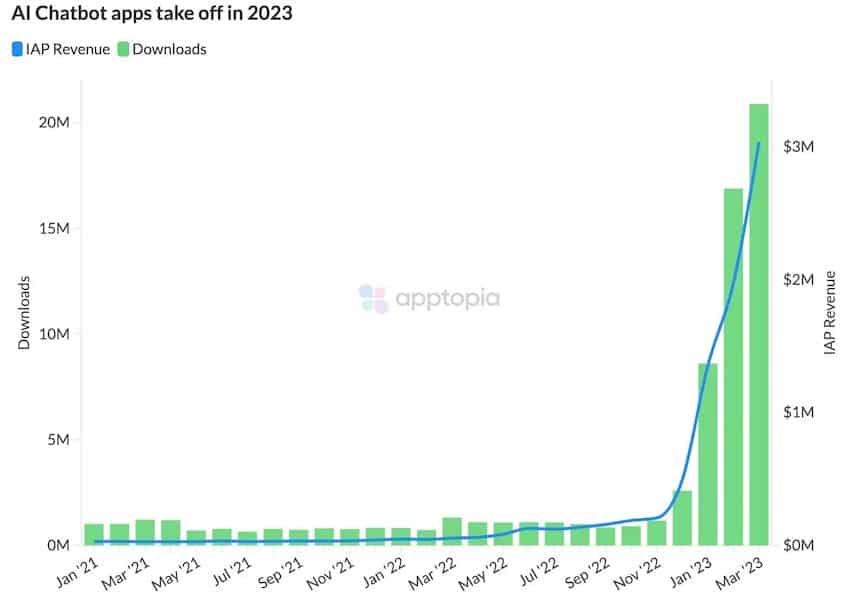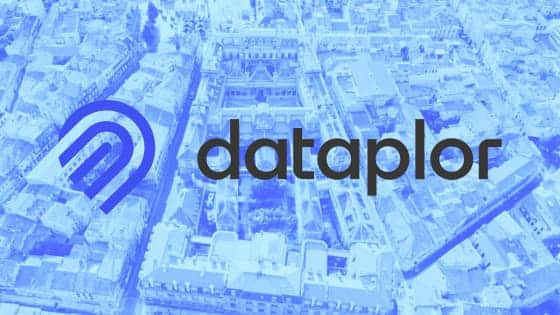Generative AI and Conversational AI are all the buzz in tech & media circles. There’s also a standard dose of fear-mongering throughout cable news. These are all signs that a hype cycle is underway. But unlike hype cycles without substance (we’re looking at you, metaverse), AI is finding real traction today.
The latest piece of evidence to back up that claim comes from app analytics firm Apptopia. Among other findings, 158 AI chatbot apps hit iOS and Android app stores in Q1. This is a 1480 percent year-over-year increase, flowing directly from the fact that OpenAI publicly released Chat GPT in March.
The app count will presumably be much larger when Q2 figures are released – not just due to a longer span of time with Chat GPT in the market, but accelerating levels of AI interest and demand signals. The excitement levels around AI have elevated considerably since Q1, at least anecdotally speaking.

Purpose & Personality
Beyond the number of apps launched – a directional but limited data point – we can go deeper into things like traction, engagement, and revenue. Taking those one at a time, apps with titles or descriptions that include terms like “AI” and “chatbot” have meaningfully broken into the top app download charts.
For example, the Chat with Ask AI app – though awkwardly named – is on the top 10 free app list on iOS in several countries. As for traction, AI and chatbot app downloads have increased 1,506 percent year-over-year, reaching almost 20 million in March. Again, we expect that to grow in Q2.
Moving on to revenue, app download growth has been coupled with revenue growth. Specifically, consumer spending on or in these apps has grown 4,184 percent year-over-year in March, approaching $3 million. Separate data from data.ai (formerly App Annie) reports $6 million in revenue in February.
As for how these apps make money, some are premium apps while others are free to download but include in-app purchases. The latter includes things like unlocking larger numbers of queries and chatbot conversations after the user is hooked. This is a common model in mobile gaming.
But most of all, this monetization is essentially taking AI chatbot technology – which is increasingly prevalent on the web – and packaging it up in a native app and charging money for the experience. In some cases, these apps differentiate through design, marketed purpose, verticals, or “personalities.”

Ubiquitous & Familiar
Beyond app store analytics, a few other points of validation have crossed our desks. The most notable is Microsoft’s traction around Bing and its Edge Browser, now that they have Chat GPT baked in. The Bing app’s average daily downloads have grown 1,000 percent year-over-year and Edge jumped 135 percent.
Altogether, it answers a question we posed on episode 16 of This Week in Local. Though AI is getting its fair share of attention in tech & media circles, there’s a question of if that’s translating to real usage among average individuals and companies. All the above signals that the answer is yes, for now at least.
We posed this question in light of Adobe’s new “Firefly” and “Sensei” integrations into the Creative Cloud and Experience Cloud, respectively. The thought is that these not only boost Adobe’s platforms but could do AI a favor in accelerating adoption by baking it into ubiquitous and familiar products.
Further supporting AI’s tangible value, Adobe Chief Product Officer Scott Belsky recently compared AI and metaverse hype cycles in pointing out that the former is tangible, while the latter is vapor. Though he’s admittedly biased, his point is well-taken. The takeaway: All hype cycles aren’t created equal.
Editor’s note: This topic will be discussed on stage at next week’s L23 conference in a session about whether or not ChatGPT is a “Google Killer.”
Ep. 16 of This Week in Local Explores Adobe’s AI Moves and Apple Pay Later




